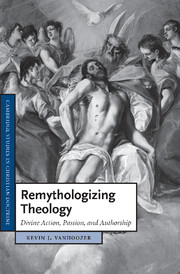Book contents
- Frontmatter
- Contents
- Preface
- Introduction: What is remythologizing?
- Part I “God” in Scripture and theology
- Part II Communicative theism and the triune God
- Part III God and World: authorial action and interaction
- 6 Divine author and human hero in dialogical relation
- 7 Divine communicative sovereignty and human freedom: the hero talks back
- 8 Impassible passion? Suffering, emotions, and the crucified God
- 9 Impassible compassion? From divine pathos to divine patience
- Conclusion: Always remythologizing? Answering to the Holy Author in our midst
- Select bibliography
- Index of subjects
- Index of scriptural references
8 - Impassible passion? Suffering, emotions, and the crucified God
Published online by Cambridge University Press: 04 May 2010
- Frontmatter
- Contents
- Preface
- Introduction: What is remythologizing?
- Part I “God” in Scripture and theology
- Part II Communicative theism and the triune God
- Part III God and World: authorial action and interaction
- 6 Divine author and human hero in dialogical relation
- 7 Divine communicative sovereignty and human freedom: the hero talks back
- 8 Impassible passion? Suffering, emotions, and the crucified God
- 9 Impassible compassion? From divine pathos to divine patience
- Conclusion: Always remythologizing? Answering to the Holy Author in our midst
- Select bibliography
- Index of subjects
- Index of scriptural references
Summary
If God as actus purus, as pure activity, is the God of abstract philosophy; so, on the other hand, Christ, the God of the Christians, is the passio pura, pure suffering – the highest metaphysical thought, the être suprême of the heart.
As goes impassibility, so goes the ability for language to name something other than a mere human creature. For what is at stake in the doctrine of impassibility is nothing less than the possibility that we can speak of God in such a way that this speech is something other than speaking about ourselves.
At the beginning of this work we examined ways of moving from biblical representations to theological conceptualizations. We encountered there the Scylla and Charybdis of theology's search for understanding. We fall back into myth (and mythologizing) when we treat God as a being or agent on the same level as other beings and agents – as a creature writ large, as it were. Conversely, we lose the category of divine action altogether when, by demythologizing, we refuse all thought of God actually speaking and doing things in space-time. We lose the theo of theodrama in the one case, the drama in the other.
In Part II we described the God–world relation in terms of triune communicative action. Though God communicates his goodness to creation in a general sense, we have focused on the biblical mythos (viz., the theodramatic story line), where the main interest lies in God's verbal communication to human beings.
- Type
- Chapter
- Information
- Remythologizing TheologyDivine Action, Passion, and Authorship, pp. 387 - 433Publisher: Cambridge University PressPrint publication year: 2010

